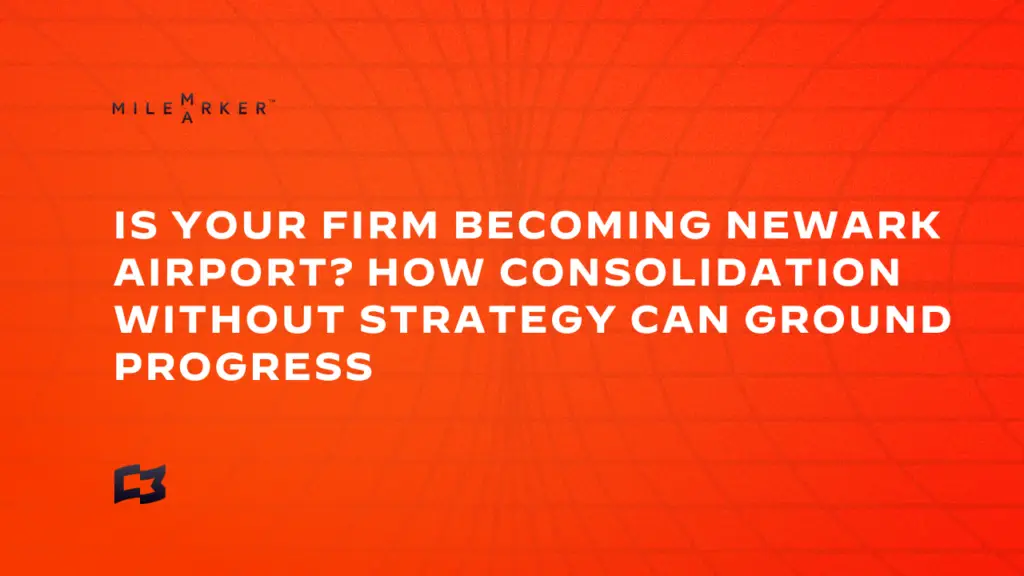Is Your Firm at Risk of Newark Airport’s Consolidation Chaos?

If you’ve flown recently—especially through Newark Liberty International Airport—you might’ve felt like you were navigating a system on the brink.
Flights delayed, rerouted, or outright canceled. Newark’s chaos has made national headlines, and if you’re a United Airlines customer, it’s likely hit even closer to home. But what’s really happening here? And what does it have to do with the way we’re consolidating technology and operations inside wealth management firms?
Despite its longstanding reputation, Newark has recently hit new lows. United Airlines, the airport’s main carrier, just cut 35 daily round-trip flights due to unmanageable delays and operational chaos. Behind the curtain? A centralized air traffic control move that was supposed to fix things—and instead made them worse.
In July 2024, the FAA shifted Newark’s airspace control from New York TRACON in Long Island to Philadelphia in an effort to address staffing shortages and “improve efficiency” (CBS News). But the result? Widespread burnout, controller trauma leave, and even a 90-second blackout in which planes lost both radar and radio contact (ABC 7). No backup system. No warning. Just grounded flights, stressed controllers (who have amazingly, thankfully, skillfully avoided crashes) and national headlines.
But this article isn’t really about airspace.
It’s about your firm.
What Newark Can Teach Us About Consolidation
When I was leading platform migrations at Orion, I was overseeing the movement of 32 firms every quarter. That’s right—32 firms, four times a year.
We got incredibly good at it. And since then, Orion has grown and professionalized its process even further, maturing into one of the industry’s most robust platforms.
But even with a well-oiled machine, we hit turbulence during the rare cases of mass consolidation. When firms like Focus Financial or WealthTrust needed to unify multiple bespoke systems into one, the tension was palpable. These weren’t routine tech upgrades—they were cultural rewrites. It was stressful. And in more than a few cases, you could feel the trouble on the tarmac.
Centralization Is Not a Silver Bullet
Newark’s breakdown is a lesson we keep forgetting: just because something is centralized doesn’t mean it’s optimized.
In wealth management, leaders often think that consolidating platforms—portfolio accounting, CRM, planning—will unlock simplicity and scale. But too often, it introduces friction, slows down teams, and creates a monoculture that stifles innovation.
Instead of solving for complexity, centralization moves it downstream and locks up the ability to respond locally.
What You Can Do Differently
The most efficient firms don’t force uniformity—they orchestrate interoperability.
They unify at the data layer, not the software layer. They respect the systems their advisors and ops teams already know and use. They consolidate insight, not just infrastructure.
Here’s how you avoid becoming Newark:
1. Start with your data.
Integrate systems in a way that surfaces truth—firm wide reporting, valuation clarity, advisor experience—all from a single, trusted layer.
2. Protect what’s working.
Don’t break adoption just because you want uniformity. Adoption is earned. If a system is delivering results, build around and with it.
3. Think like a network, not a hub.
Your firm isn’t one big machine—it’s a network of people, preferences, and client needs. Consolidation should support that, not flatten it.
4. Focus on experience, not systems.
Whether it’s a client onboarding process or internal workflow, build an experience layer that brings cohesion without heavy re-platforming.
The Final Boarding Call
Are you operating like Newark—overburdened, delayed, clinging to an outdated centralization play? Or like a well-run FBO—nimble, client-ready, grounded in flexibility?
The race to simplify is understandable. But simplicity achieved through brute-force consolidation rarely works. What does work is intentional unification—with data as the backbone, and respect for your firm’s DNA at the center.
Let’s not wait for a radar blackout to re-evaluate our approach.
